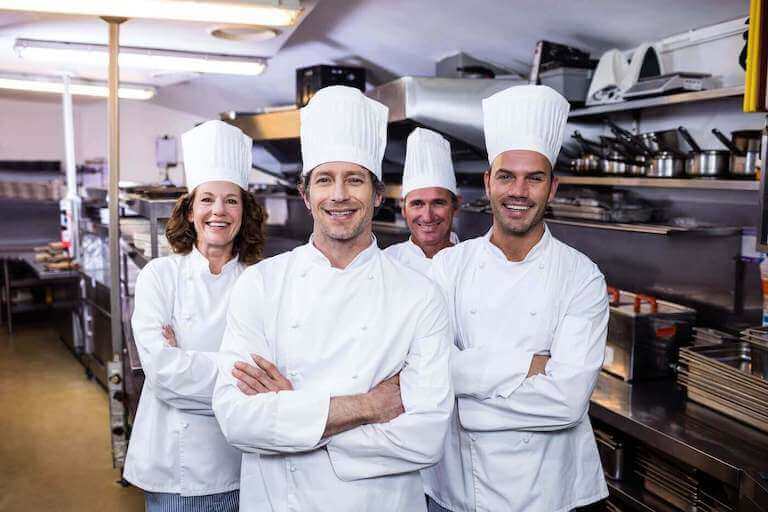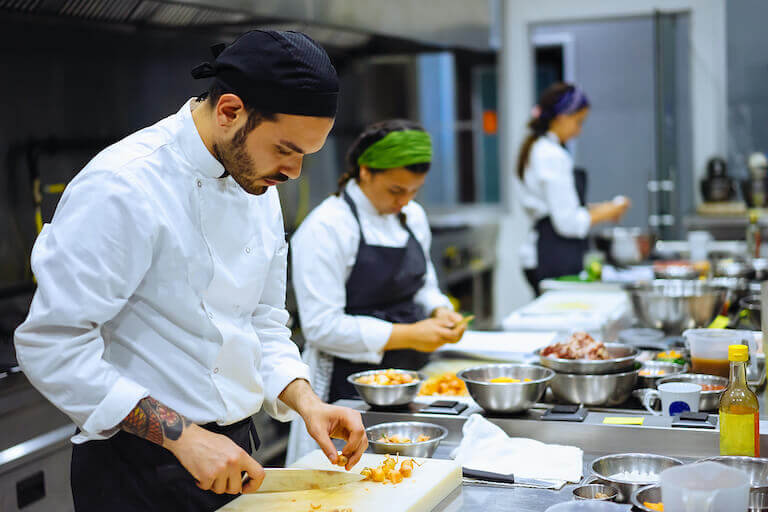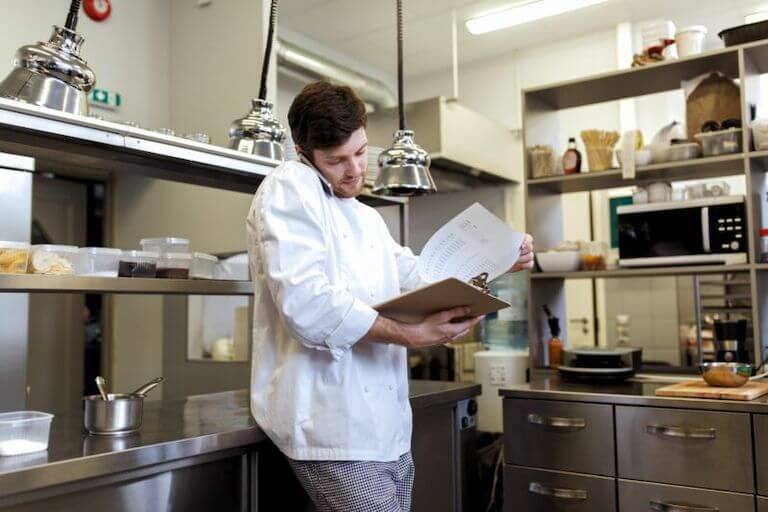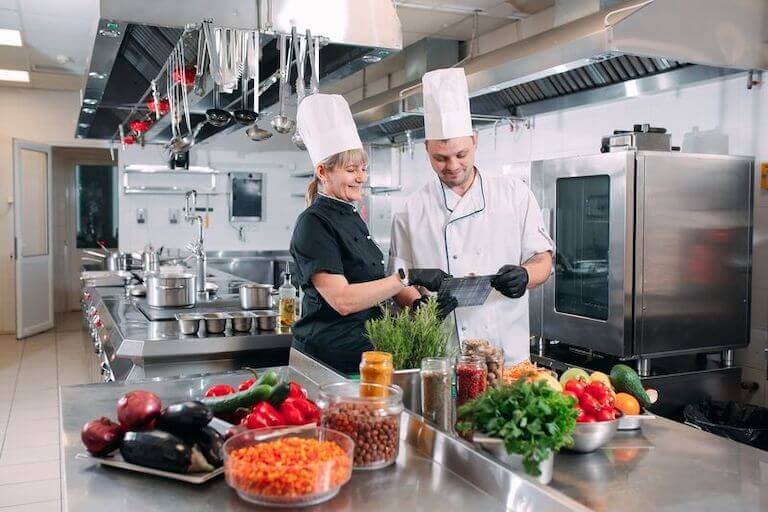Listen to This Article:
Knowing the essential skills needed to be a chef can help you further your career by learning where to focus your time and attention or help you decide if a career path as a chef is right for you. While understanding cuisine is important, becoming a successful chef takes much more than that. It combines technical culinary skills, leadership skills, creativity, and resilience.
This guide will explore the key skills that can help you become a chef or excel in the role.
What Is a Chef?
Before diving into a list of skills, it’s essential to understand the role of a chef and what sets them apart from a cook.
Many people think of a chef as someone who prepares food, and while that can be part of their role, a professional chef oversees and manages the kitchen’s operations as well. They may be responsible for planning the menu, creating recipes, sourcing ingredients, managing staff, and maintaining the food’s quality and consistency.

Chefs are responsible for many tasks in a restaurant from understanding cooking techniques to menu development and quality control.
A professional kitchen may have several different chefs, each serving in very specific roles. For example, an executive chef oversees all the kitchen operations and a sous chef assists with managing the kitchen and staff. There can also be specialized chefs in restaurants serving in specific roles, such as a pastry chef being responsible for desserts or a saucier handling sauces and stews. Each chef can bring unique expertise, helping the entire kitchen to succeed.
Therefore, many culinary skills and non-culinary skills can contribute to a successful career as a chef.
7 Technical Culinary Skills You May Need to Become a Chef
Once you have a clear understanding of the chef’s role, the next step is to acquire the technical culinary skills that form the foundation of this profession. From sautéing to braising, knowing the best option for cooking based on each recipe makes a significant difference in the taste and texture of a dish.
There is a wide range of these skills that a chef may need to succeed, depending on their specific role. For example, a pastry chef will need different technical skills than a saucier.
Below is a list of some of the culinary skills that a chef may need. But take time to explore the different areas of study in the culinary industry to learn which path is of the most interest to you and discover which culinary skills are important for that role.
1. Knife Skills
Honing knife skills can enhance your efficiency as a chef and promote kitchen safety. Understanding how to make basic cuts like julienne, dice, and chiffonade can help improve food presentation and consistency in each dish. In addition, knowing how to properly care for your knives can ensure they remain sharp for precise cuts every time.

Honing cooking techniques can help a cook as they work to transition into the role of a chef.
2. Seasoning Knowledge
There’s a reason restaurant dishes hit your tastebuds differently than dishes cooked at home. Professional chefs understand the importance of seasoning, how flavors complement each other, and when to season dishes throughout the cooking process. Flavor is essential to a successful dining experience, so culinary students at Escoffier are taught the principles of seasoning during the Culinary Foundations course.
3. Cooking Techniques
Professional chefs need to know the best cooking method to use for each dish they prepare.
Common cooking techniques include:
- Sautéing: Cooking food quickly over high heat in a small amount of fat or oil and turning only once.
- Braising: Browning meat, typically with vegetables, in oil or fat, then adding a small amount of liquid and cooking slowly. It is generally used on tough cuts of meat.
- Grilling: Cooking food on metal racks directly over the heat source or open flame.
- Steaming: Using steam to cook the food to help preserve nutrients and texture.
- Poaching: Cooking food slowly in simmering liquid.
- Roasting: Cooking food with dry heat in an oven or over an open fire on a spit.
- Blanching: Reducing the final cooking time by first cooking food in boiling water. Typically used with vegetables but can be used with fish and meat.
- Frying: Cooking food in oil or fat.
4. Sauce Making
From foundational stocks to complex reductions and emulsions, sauces are important in elevating flavors and enhancing dishes. Professional chefs should understand the nuances of ingredient ratios, heat control, and seasoning to ensure each sauce complements the dish. Using sauces, chefs can create a diverse range of flavors to appeal to various palates.
5. Butchery Skills
From breaking down whole animals to making precise cuts for specific dishes, butchery skills can help chefs as they prepare and cook meat. Butchery includes knife techniques, knowledge of anatomy, and portioning.
When a chef is proficient in butchery, they can reduce waste, make consistent cuts, and ensure optimal use of the ingredients to enhance flavor profiles.
6. Fish Fabrication
Fish fabrication is indispensable for chefs specializing in seafood cuisine. From filleting and skinning to handling delicate textures, chefs can ensure each piece is prepared with precision and care. It’s important for chefs to understand fish anatomy, knife techniques for various species, and proper storage practices to ensure freshness and quality.
7. Baking and Pastry Skills
Complementing your cooking techniques with baking and pastry skills can significantly enhance your skill set. Even if you specialize in savory dishes, a solid grasp of baking and pastry basics can help elevate your culinary repertoire. For instance, mastering techniques like making flaky pie crusts or delicate pastries can add diversity to your menu offerings, enhancing the dining experience for your guests.
Engaging in baking classes, experimenting with various ingredients such as different types of flours and sugars, and practicing different recipes like breads, cakes, and tarts are invaluable steps toward developing these skills.
Kitchen Management and Organization
While technical skills can help make a great cook, kitchen management skills are crucial to helping a chef create a harmonious and productive culinary environment. They can help ensure a smooth workflow and high productivity.
Below are some management and organization skills that can help a chef succeed professionally.

Inventory management and planning is an essential management skill for chefs to master for success.
Time Management
While running a kitchen, chefs may need to know how to create schedules, delegate tasks, and use prep lists to help manage time effectively.
Mise en place, batch cooking, and similar techniques can help save time in a busy kitchen. In addition, automation tools, like smart appliances and time-tracking software, can further enhance time management in a professional kitchen.
Inventory and Cost Control
Minimizing waste and keeping track of ingredients is essential for cost-effective kitchen management. By implementing strategies like buying in bulk, using seasonal ingredients, and proper storage methods, chefs can streamline inventory management and reduce unnecessary expenditures.
Using inventory management software and conducting regular audits can help improve inventory control and management. These practices contribute to financial savings and also support sustainability efforts by reducing food waste and ensuring ingredients are used optimally.
Creativity and Innovation
With a chef’s creativity and innovation, ordinary meals can be transformed into extraordinary culinary experiences. Great chefs can be set apart by their creativity and ability to create memorable dining experiences.
Menu Planning
As a chef, you may be responsible for menu planning for a restaurant. Crafting signature dishes, building specials based on seasonal ingredients, and blending diverse culinary traditions through fusion cuisine can help attract and delight customers.
Cooks and aspiring chefs can find inspiration through global cuisine, food festivals, and collaboration with other chefs. Following along with emerging trends in the food industry and practicing with different techniques and flavors can help chefs create menus that satisfy diners’ palates and showcase their passion for culinary excellence and commitment to delivering exceptional dining experiences.

Menu planning can be an important role for a chef, helping create a memorable dining experience.
Flavor Profiling
Understanding flavor profiles is essential for helping chefs create dishes that are both balanced and complex. Chefs can experiment with spice pairings to develop new flavor combinations that elevate their culinary creations.
Advanced flavor profiling techniques, such as molecular gastronomy and sensory evaluation methods, can be used in the process. These sophisticated approaches enable chefs to delve deeper into the nuances of flavors, enhancing their ability to innovate and refine their culinary offerings.
Plating and Presentation
The presentation of a dish can influence diners’ first impressions and overall dining experience. Plating and presentation skills are integral aspects of culinary artistry. Chefs skilled in plating can balance colors, portions, and textures to create visually stunning dishes. They pay close attention to detail in the arrangement and use of garnishes to enhance the visual appeal of the dish and convey their culinary vision.
Leadership and Communication
With so many cooks in the kitchen, effective leadership, and clear communication are essential. The kitchen can be a high-pressure environment, and chefs must know how to operate successfully in it while keeping things running smoothly and consistently.
Team Management
Chefs must provide clear instructions, offer support, and acknowledge the achievements of those around them to help motivate the team. Understanding and using team-building activities and knowing conflict resolution strategies can help keep the team and kitchen running smoothly.
*Information may not reflect every student’s experience. Results and outcomes may be based on several factors, such as geographical region or previous experience.
Communication Skills
Using clear communication can help prevent mistakes and ensure smooth kitchen operation. There are three forms of communication that can impact the performance of staff:
- Horizontal: Communication between employees at the same level
- Downward: Communication from superiors to subordinates
- Upward: Communication from subordinates to superiors
Therefore, feedback sessions and regular briefings are effective communication techniques to use within the team to keep everyone on the same page. However, with multiple shifts and schedules, this can be difficult, so digital communication tools and apps can help keep everyone connected and avoid confusion.
Physical and Mental Stamina
A chef’s job can be physically and mentally demanding, requiring endurance and the ability to overcome obstacles. Chefs often work long hours with demanding tasks. Regular exercise, good nutrition, and adequate rest can help you stay feeling your best while working in the kitchen. According to bountiful scientific research, exercise can also serve as a form of stress relief and self-care to help you feel your best.
Physical Fitness
Chefs are often required to work long shifts on their feet, maneuvering in tight spaces, and handling heavy equipment. Physical fitness activities like cardio, strength training, and flexibility exercises can support stamina and reduce the risk of workplace injuries. Taking a proactive approach to health can enhance your performance and longevity in the culinary field.

Taking care of your physical health can help you manage the stress of the demanding role of a chef.
Kitchen Accessibility
Ensuring that kitchens are accessible for all individuals, including those with physical disabilities, is crucial for fostering inclusivity and equal opportunities in the workplace. Adjusting countertop heights, using ergonomic tools, and opening clear pathways can make a significant difference in accommodating chefs and kitchen staff of diverse abilities.
Stress Management
Knowing how to manage stress is crucial when operating in a high-pressure environment. Mindfulness, yoga, meditation, taking breaks, and seeking support from family and friends can help you effectively manage stress and avoid the burnout that chefs can experience.
Escoffier offers dedicated Success Coaches to help support online students through the stress and questions of culinary school. In addition, professional counseling can also play a vital role in protecting your mental health when needed so don’t be afraid to reach out for help.
Continuous Learning and Professional Development
In the ever-evolving culinary industry, continuous learning and professional development are key to staying ahead of the curve. Keeping up with culinary trends can help ensure that your skills and offerings remain relevant and exciting.
*Information may not reflect every student’s experience. Results and outcomes may be based on several factors, such as geographical region or previous experience.
To become a successful chef, excelling in culinary technical skills, managing a kitchen efficiently, nurturing creativity, leading effectively, maintaining stamina, and committing to continuous learning are essential. Formal education and training can provide a strong foundation and professional credentials to help you excel. So, assess your skills and identify areas for improvement that could help advance your culinary career.
If you’re ready to take the next step in achieving your goals and excelling in the culinary world, consider exploring culinary education opportunities at Escoffier. Contact us today to learn more about how our programs can help you develop the skills needed to thrive in the culinary industry.



